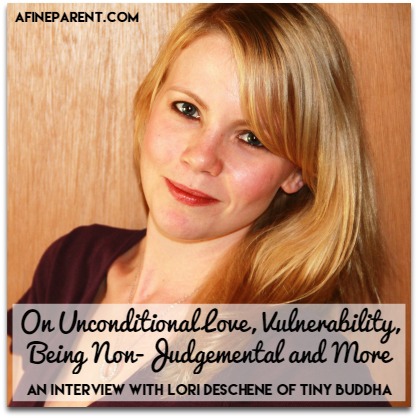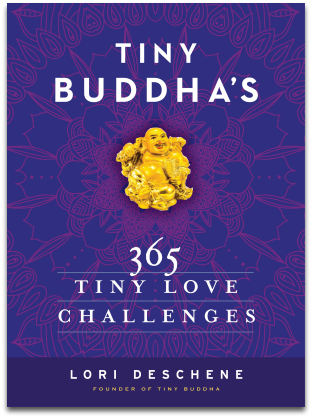 Have you even met someone who seem like they are very different from you, but before you know it, they touch your life in irrevocable ways and inspire you to be a better version of yourself?
Have you even met someone who seem like they are very different from you, but before you know it, they touch your life in irrevocable ways and inspire you to be a better version of yourself?
One such person in my life is Lori Deschene.
Lori is the founder of Tiny Buddha, a site I frequent for the touching stories about life, love and healing shared authentically by people just like you and me.
During a particularly rough patch in my life, a mentor suggested I should find a creative outlet. Knowing my love for Tiny Buddha, he asked “Why don’t you write for Tiny Buddha?”
It was well before I started this blog.
I just laughed.
I’m not a writer. Millions of people read Tiny Buddha. Surely Lori, the founder of the site, is too busy to even consider an article from an amateur like me.
The idea was just absurd.
After much dragging of feet though, I decided to give it a shot anyway.
Just as I expected, Lori turned down my article.
What I didn’t expect however was how gentle she was about the rejection, and how encouraging she was that I should try again.
I tried again.
This time my article was published. I went on to write several more articles for Tiny Buddha.
I can’t tell you how cathartic it felt – to write, to connect, and in a few cases, actually touch people’s lives in meaningful ways.
As much as I cherish the experience of writing for Tiny Buddha though, it is my interaction with Lori that had the biggest impact on me. She has the rare skill of kindly and effortlessly handling something many of us parents struggle with –
How do you say no without breaking a heart (and the spirit)? How do you reject something without belittling the person behind the request? How do you provide critical feedback while remaining a source of encouragement?
We parents deal with this on a daily basis — whether it is to turn down a request from a child to continue reading for just 5 more minutes at bedtime, or telling them that they can’t sign up for ballet lessons, or that they need to keep practicing on their painting/piano/sports?
 Lori published a book called Tiny Buddha’s 365 Tiny Love Challenges and she did a blog tour to promote it. I was lucky that she chose A Fine Parent as one of her stops. I had a wonderful time chatting with her about all of the above questions and then some. We discussed unconditional love, judgement, vulnerability, encouragement and so much more. There are so many tiny insights in this little discussion! I hope you enjoy reading it as much as I did putting it together.
Lori published a book called Tiny Buddha’s 365 Tiny Love Challenges and she did a blog tour to promote it. I was lucky that she chose A Fine Parent as one of her stops. I had a wonderful time chatting with her about all of the above questions and then some. We discussed unconditional love, judgement, vulnerability, encouragement and so much more. There are so many tiny insights in this little discussion! I hope you enjoy reading it as much as I did putting it together.
1. Hi, Lori! So glad to have you on A Fine Parent. Can we start by talking a little about what Tiny Buddha is and why you started it?
Thank you so much for having me, Sumitha! I’m excited to share a little more about Tiny Buddha and this book.
I started the site in 2009 after struggling for over a decade with bulimia, depression, shame, and self-loathing. For years I felt alone with my challenges—like no one knew me, and no one would love me if they did.
After making tremendous progress with my personal struggles, I wanted to create a place where people could share what they’ve been through and what they’ve learned to help themselves and others.
My hope was that this would help readers feel less alone with their challenges and more empowered to overcome them. And though I didn’t realize this at the time, I eventually recognized that starting Tiny Buddha was a big part of my own healing journey.
There’s something cathartic about leveraging your pain for something useful and valuable—and there’s little more valuable than making a positive difference in someone else’s life.
2. Amazing! What strikes me the most about Tiny Buddha is how different we all are, and yet at the core, we have more similarities than we realize. Still, it is hard sometimes not to become judgmental. Even with our own kids whom we adore, we sometimes tend to judge a bit too harshly.
How do you manage to not be judgmental about the authors whose stories you share? How did you build a community that is so accepting and inclusive?
It’s so true! We’re all much more alike than we may think. Like anyone, I have my judgmental moments, but I can’t recall a time I judged a site contributor, probably because I can relate to the experiences and feelings they’ve shared and I admire their courage and vulnerability.
I think that’s one of the perks of having done a lot of things you’re not proud of—you can empathize with a lot, and you’re not too quick to judge!
As for the community, I think it’s full of accepting, non-judging people because that’s what Tiny Buddha is all about—learning from each other and honoring each other, not tearing each other down.
People associate Tiny Buddha with genuine, loving, compassionate connections. I’d like to think I had something to do with this, as I set the tone of the site with my initial posts and responses to reader comments. And I also actively monitor comments and delete any that seem harsh or judgmental—and then email those people to explain why I did this.
But really, the community is full of accepting, non-judging people because the world is full of them. It’s just a matter of wrangling them together, and I’m thrilled Tiny Buddha has done that!
3. Talking about love and compassionate connections, one of things that we discuss here at AFP is unconditional love. I believe that almost all of us parents feel this for our kids. However, showing it to our kids is an entirely different issue.
As we go about our daily lives, we get so wrapped up in the mini-emergencies of the moment and the little stresses that go with it, that at best, we simply forget to show that underneath it all we do care, and at worst, we downright rain in on them with yelling, snapping, punishment etc.
How can we stay unconditionally loving, and show it, in spite of the pressures of day-to-day life?
 I don’t know if it’s possible for anyone to always show unconditional love. We’re all only human, and that means there will be times when others do things that test our patience, and there will be times when we fail to treat them with compassion, acceptance, and kindness simply because we’re struggling with our own issues.
I don’t know if it’s possible for anyone to always show unconditional love. We’re all only human, and that means there will be times when others do things that test our patience, and there will be times when we fail to treat them with compassion, acceptance, and kindness simply because we’re struggling with our own issues.
I do think, however, we can treat people lovingly more often, and that’s what my book is all about. It offers a year’s worth of simple daily challenges to help people give more love in their relationships, treat themselves more lovingly, and put more love into the world.
Some of them are active, some are reflective, some involve having conversations with other people, and some are writing exercises.
Each month has a different theme, including:
- Kindness and Thoughtfulness
- Compassion and Understanding
- Authenticity and Vulnerability
- Releasing Anger and Forgiving
- Attention and Listening
- Honesty and Trust
- Kindness and Thoughtfulness
- Acceptance and Non-Judgment
- Releasing Comparisons and Competition
- Support and Encouragement
- Admiration and Appreciation
- Giving and Receiving
And every week starts with a relevant story or two from members of the Tiny Buddha community, illustrating the power of applying these principles in daily life.
The challenges are all little things, and some might seem simple, but the simplest things are often the hardest to do consistently—like putting your phone down and giving someone your full attention, or looking a stranger in the eye and smiling.
Relationships have never been my strong suit—I’m a former loner, as I mentioned before—but I feel much closer to people, and much better equipped to give them the love they deserve, since incorporating these tiny actions into my daily life.
4. I love the idea of tiny challenges! Can you talk a little more about some of the little challenges we parents might try?
I can think of countless challenges that would be useful for parents, so I’ll just share the first few that came to mind:
 From the kindness and thoughtfulness section:
From the kindness and thoughtfulness section:
Write down three things you hope people do and three things you hope they don’t do when speaking to your child (or future child). Remember these things today when you’re speaking to others to help you be kinder.
I think this is an interesting one to apply to the parent-child relationship because it’s easy to recognize things we wouldn’t want someone else to do to our children, but not so easy to catch ourselves when we do these things. For example…
DO:
- Be considerate of my child’s feelings
- Show an interest in what they have to say
- Give them your compete attention
DON’T
- Yell at them
- Talk down to them
- Ignore them
Asking yourself, “Would this be okay if someone else did this to my child?” could be a great way to recognize and challenge potentially harmful patterns.
From the compassion and understanding section:
Instead of treating someone how you want to be treated, ask them how they want to be treated, and do that.
It was such a powerful insight when I realized not everyone wants to be treated how I’d want to be treated. Up until that point, I pushed my own wants on people, assuming I was doing right by them. Then it occurred to me that someone else might prefer space when I’d appreciate someone pushing me to talk. And someone else might just want to vent when I would prefer advice.
This can be even more complicated when it comes to children, as they haven’t yet gotten clear about their needs and wants. But asking them can go a long way. It shows that their wants, needs, and preferences are important.
For example: I imagine you’re upset that your friend cancelled your plans. Do you want to talk about it, or would you rather have some space to yourself?
From the releasing anger and forgiving section:
Think about how your parents (or the people who raised you) processed and responded to anger. Write down anything unhealthy you learned from them and what might be a healthier choice. (The goal is not to blame them for their shortcomings, but to recognize how you formed some of your patterns and what you can do to change them.)
So many of us learn how to parent from the way we were parented. (At least, those who aren’t subscribed to this wonderful site!) It can be a powerful exercise to recognize anything we picked up from our own parents and what we can do that would be healthier.
For example, I grew up around someone with a hair-trigger temper who reacted quickly and impulsively before thinking things through. For me, creating a pause between an event and my reaction is huge. It’s definitely not easy, but I respond more calmly, rationally, and respectfully when I am able to do this.
5. What about when if we fail at these little challenges?
I think one of the things that gets in the way of parents is the notion that since we are responsible for bringing up our kids, we should somehow be above them – that we are not allowed to make mistakes and if we do, we should not let them see it.
I think many of us parents inevitably expect some level of perfection from ourselves, which I think does more harm than good. Will you please talk about that a little?
 I’ve actually thought about this a great deal myself. However, not only does hiding our mistakes limit the potential for true connection, it also teaches kids that it’s not okay to make mistakes.
I’ve actually thought about this a great deal myself. However, not only does hiding our mistakes limit the potential for true connection, it also teaches kids that it’s not okay to make mistakes.
I think parents often fear they’ll undermine their authority if they acknowledge a shortcoming. But this kind of honesty communicates to children that we all mess up from time to time; what matters is what we do after that. And it also says: I am not better than you, and you are worthy of my apology.
Not too long ago I was on an airplane with a mother of two. It was right at the end of the flight, and her pre-school-age son was getting a little worked up while they waited standing near the bathroom.
Trying to be empathetic, I looked at her and said, “I really admire your patience!” Then we both laughed a little.
This got her son even more upset, as he thought we—his mother and a perfect stranger—were laughing at him. She eventually told him to sit, right there on the floor, I imagine in an attempt to exert some control.
I could see he was getting more and more distressed, so finally I leaned down and said, “I’m sorry I laughed. I shouldn’t have done that.”
I felt a little vulnerable standing where people could see me, apologizing to a child I didn’t know for something as innocent as laughing. But I could understand his feelings. He was clearly having a hard time, and he thought we were mocking him.
When he noticeably calmed down, his mother looked at me and said, “Thank you so much.”
Moments later, when I left the plane, I saw them standing outside the door. The little boy looked at his mother and said, “Sorry, Mommy.”
Now, I’m not arrogant enough to think my apology inspired his. Maybe he regularly has tantrums, as children do, and apologizes, without fail, every time. Maybe an apology from a stranger really isn’t that big of a deal.
Or maybe it reminded him that people make mistakes sometimes, and it’s okay if they own up to it. And also: he doesn’t deserve to be treated unkindly or disrespectfully.
6. Gosh, that’s so true! I’ve been enjoying reading Tiny Buddha’s 365 Tiny Love Challenges and trying the little challenges. While it is a great book for all, I think it can be a great investment particularly for parents. How do you see your book benefiting parents?
I believe Tiny Buddha’s 365 Tiny Love Challenges will help them have fewer angry, negative interactions with their children and more loving, positive ones. Equally important, it will help them better meet their needs in their other relationships, which will go a long way in helping them meet their children’s needs.
I thoroughly enjoyed chatting with Lori and hope you found the insights as inspiring as I did! Tiny Buddha’s 365 Tiny Love Challenges is available at most bookstores. Grab a copy and try the daily challenges with your family today!
What a lovely person! (Actually, two lovely people.) Thank you so much for sharing your interview. It’s encouraging, particularly on the internet, to hear people concerned with compassion in this world.
Thanks, Korinthia 🙂 Do you read Tiny Buddha? If not, check it out. The articles shared there are very good. And as a blogger yourself, I think you will appreciate the kind of tone and spirit of the community Lori has been able to create there!